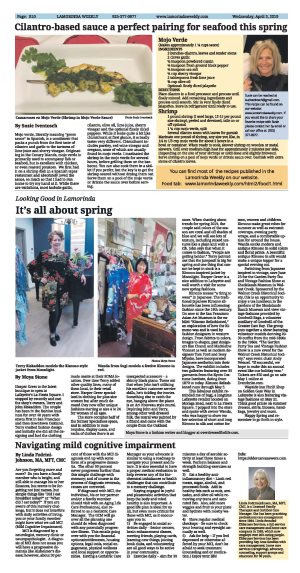| | Published April 3rd, 2019
| Navigating mild cognitive impairment
| | | By Linda Fodrini-Johnson, MA, MFT, CMC |  | | Linda Fodrini-Johnson, MA, MFT, CMC, is a Licensed Family Therapist and Certified Care Manager. She has been practicing professional care management since 1984. Linda founded Eldercare Services, a full-service care management and home care company in 1989, which now employs over 200 caring people. Eldercare Services has been providing Bay Area families with care management, home care services (caregiving), advocacy, counseling, support groups and education for 30 years. |
Are you forgetting more and more? Do you have a family member who is bright, and still able to manage his or her finances, but seems to be forgetting not just names, but simple things like "Did I eat breakfast today?" or "What did I eat today?" If you are aware of this memory challenge, but it does not interfere with daily activities of living, you or your family member might have what we call MCI (Mild Cognitive Impairment).
 MCI is diagnosed by a neurologist, memory clinic or neuropsychologist. A diagnosis of MCI does not mean you will have a progressive dementia like Alzheimer's disease; however, about 50 percent of those with the MCI diagnosis end up with some form of a progressive dementia. The other 50 percent never progresses further than this simple challenge with memory; and of course in the process of diagnosis reversals, causes are corrected.
MCI is diagnosed by a neurologist, memory clinic or neuropsychologist. A diagnosis of MCI does not mean you will have a progressive dementia like Alzheimer's disease; however, about 50 percent of those with the MCI diagnosis end up with some form of a progressive dementia. The other 50 percent never progresses further than this simple challenge with memory; and of course in the process of diagnosis reversals, causes are corrected.
 If diagnosed with MCI, the individual, his or her partner and/or a family member should visit with an Aging Life Care Professional, also referred to as a Geriatric Care Manager. The GCM will go over all the planning one should do when diagnosed with any potentially progressive illness. This entails going over with you the financial options/entitlements, housing options, legal tools, social engagement, physical wellness and local support or opportunities. Having a Geriatric Care Manager as your advocate is similar to using a roadmap to navigate your present and future. It is also essential to have a proper medical evaluation to help reverse any of the biochemical imbalances or health challenges that can contribute to a memory challenge.
If diagnosed with MCI, the individual, his or her partner and/or a family member should visit with an Aging Life Care Professional, also referred to as a Geriatric Care Manager. The GCM will go over all the planning one should do when diagnosed with any potentially progressive illness. This entails going over with you the financial options/entitlements, housing options, legal tools, social engagement, physical wellness and local support or opportunities. Having a Geriatric Care Manager as your advocate is similar to using a roadmap to navigate your present and future. It is also essential to have a proper medical evaluation to help reverse any of the biochemical imbalances or health challenges that can contribute to a memory challenge.
 Staying engaged in joyful and pleasurable activities that keep the body and mind healthy is also important. A good life plan is ideal for us all, but even more critical for those with MCI, as it encourages you to:
Staying engaged in joyful and pleasurable activities that keep the body and mind healthy is also important. A good life plan is ideal for us all, but even more critical for those with MCI, as it encourages you to:
 1) Be engaged in social activities daily - Senior centers, brain enhancement classes, meeting friends, playing cards, learning new things, joining book clubs, and volunteering are all good ways to be active in your community.
1) Be engaged in social activities daily - Senior centers, brain enhancement classes, meeting friends, playing cards, learning new things, joining book clubs, and volunteering are all good ways to be active in your community.
 2) Exercise daily - Aim for 30 minutes a day of aerobic activity at least three times a week. Perform balance and strength building exercises as well.
2) Exercise daily - Aim for 30 minutes a day of aerobic activity at least three times a week. Perform balance and strength building exercises as well.
 3) Eat a healthy anti-inflammatory diet - Limit red meats, sugar, alcohol, and processed foods. Add in healthy fats such as nuts, avocados, and olive oil while removing any trans and saturated fats. Also, add more veggies and fruit to your plate and hydrate with mostly water.
3) Eat a healthy anti-inflammatory diet - Limit red meats, sugar, alcohol, and processed foods. Add in healthy fats such as nuts, avocados, and olive oil while removing any trans and saturated fats. Also, add more veggies and fruit to your plate and hydrate with mostly water.
 4) Have regular medical checkups - Be sure to check your hearing and eyesight annually as well.
4) Have regular medical checkups - Be sure to check your hearing and eyesight annually as well.
 5) Ask for help - If you feel depressed or otherwise affected by your MCI, don't be afraid to seek treatment (counseling and or medication.) Enjoy your life!
5) Ask for help - If you feel depressed or otherwise affected by your MCI, don't be afraid to seek treatment (counseling and or medication.) Enjoy your life!
 Info: https://eldercareanswers.com
Info: https://eldercareanswers.com

|
| | | | | | | | | | | | |



